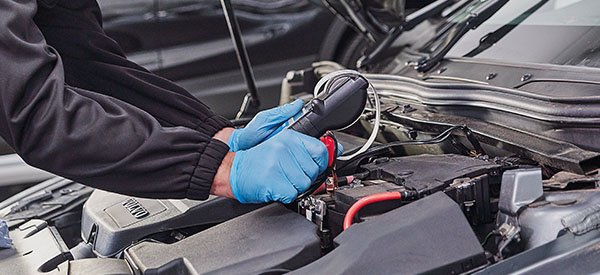Electric Vehicle Batteries: Technical Core and Performance Characteristics
As a key component of electric vehicles, electric vehicle batteries have a significant impact on the performance, range and safety of electric vehicles. The following is a detailed introduction to some of the key technical points and performance characteristics of electric vehicle batteries:
Battery Type
Lithium-ion battery: The most common type of battery used in electric vehicles. Lithium-ion batteries have the advantages of high energy density, long cycle life, no memory effect, and low self-discharge. It can convert chemical energy into electrical energy through charging and discharging reactions, thus realizing efficient energy storage and release.
Battery Structure
Battery cells and modules: Electric vehicle batteries typically consist of multiple battery cells to form a module, and then the modules are connected in series or parallel to form a battery pack. The ionic conduction between the battery cells is achieved by electrolytes or solid electrolytes, thereby realizing the charging and discharging process of the battery.
Energy Density
Energy density is one of the key indicators for measuring battery performance, which determines the range of electric vehicles. Lithium-ion batteries have achieved higher energy densities through continuous improvements in positive and negative electrode materials and electrolyte formulations, but they still need to be continuously optimized to meet higher range requirements.
Battery Safety
The safety of electric vehicle batteries is critical. Safety regulations must be strictly adhered to during the production, use and recycling of batteries to prevent safety problems such as short circuits, overheating and leakage. The use of new materials such as solid electrolytes offers a new way to improve battery safety.
دورة الحياة
Cycle life refers to the life of a battery during the charge and discharge cycle. High performance batteries should have a long cycle life to reduce the frequency and cost of battery replacement. Lithium-ion batteries have achieved high cycle life by optimizing material ratios and manufacturing processes.

Charge and Discharge Performance
The charge and discharge performance of electric vehicle batteries determines the charging speed and endurance of electric vehicles. Batteries should have faster charging speed and higher discharge efficiency to meet the needs of electric vehicles for fast charging and long driving. At the same time, batteries should also have stable charging and discharging performance to prevent performance from being affected by temperature changes or battery aging.
Battery Management System
The battery management system (BMS) is a critical component of electric vehicle batteries. It is responsible for monitoring battery status, controlling the charge and discharge process, protecting battery safety, and extending battery life. The BMS collects battery voltage, current, temperature and other parameters to monitor and intelligently manage the battery in real time to ensure that the battery is operating in the best possible condition.
Thermal Management
Electric vehicle batteries generate heat during operation that must be dissipated through a thermal management system. The thermal management system ensures that the battery operates within an appropriate temperature range using technologies such as liquid cooling, air cooling or phase change materials to prevent performance degradation or safety issues caused by excessive temperatures.
Battery Recycling and Environmental Protection
The recycling and environmental issues of electric vehicle batteries are receiving increasing attention. Used batteries contain a large amount of heavy metals and harmful substances that will pollute the environment if not handled properly. Therefore, the establishment of a complete battery recycling system and harmless treatment technology is the key to the sustainable development of electric vehicles.
In conclusion, electric vehicle batteries play an important role in the performance and safety of electric vehicles. By continuously optimizing battery technology, improving energy density, strengthening safety management and establishing a complete recycling system, we can better promote the development of the electric vehicle industry and contribute to the realization of green travel and sustainable development.
-
 Lithium-ion batteries are widely used in electronic devices such as smartphones, laptops, and electric vehicles due to their high energy density and longer lifespan compared to other battery types. Charging a lithium-ion battery with a power supply is a simple process, but it requires caution to avoid damaging the battery or causing a safety hazard. In this article, we will...اقرأ أكثر
Lithium-ion batteries are widely used in electronic devices such as smartphones, laptops, and electric vehicles due to their high energy density and longer lifespan compared to other battery types. Charging a lithium-ion battery with a power supply is a simple process, but it requires caution to avoid damaging the battery or causing a safety hazard. In this article, we will...اقرأ أكثر -
 A reliable car starter battery is essential for your vehicle performance. It provides the power necessary to start your engine, and it also supplies electricity to the electrical components in your car. Without a reliable car starter battery, your vehicle may not start, and you may experience electrical problems. There are several factors to consider when choosing a car...اقرأ أكثر
A reliable car starter battery is essential for your vehicle performance. It provides the power necessary to start your engine, and it also supplies electricity to the electrical components in your car. Without a reliable car starter battery, your vehicle may not start, and you may experience electrical problems. There are several factors to consider when choosing a car...اقرأ أكثر -
 Introduction: In recent years, the agricultural sector has witnessed a significant revolution in terms of technological advancements. One such revolution has been the development and use of high-power lithium batteries. These batteries have transformed the way agricultural tools and equipment function, providing farmers with greater efficiency, productivity, and sustainability. This article aims to explore the impact of high-power lithium...اقرأ أكثر
Introduction: In recent years, the agricultural sector has witnessed a significant revolution in terms of technological advancements. One such revolution has been the development and use of high-power lithium batteries. These batteries have transformed the way agricultural tools and equipment function, providing farmers with greater efficiency, productivity, and sustainability. This article aims to explore the impact of high-power lithium...اقرأ أكثر -
 Lithium batteries have become increasingly popular due to their high energy density, long life, lightweight and low self-discharge rate. Many applications require a higher voltage than a single cell can provide, which is why lithium batteries are often connected in series. While this approach offers several benefits, it also introduces some risks that must be understood and managed. Benefits...اقرأ أكثر
Lithium batteries have become increasingly popular due to their high energy density, long life, lightweight and low self-discharge rate. Many applications require a higher voltage than a single cell can provide, which is why lithium batteries are often connected in series. While this approach offers several benefits, it also introduces some risks that must be understood and managed. Benefits...اقرأ أكثر -
 There has been a significant increase in the demand for portable electronic products such as smartphones, tablets, laptops, and wearable devices. These devices have become an integral part of our daily lives, providing us with convenience and connectivity on the go. One of the key components that enable these devices to function seamlessly is the lithium battery technology. Lithium...اقرأ أكثر
There has been a significant increase in the demand for portable electronic products such as smartphones, tablets, laptops, and wearable devices. These devices have become an integral part of our daily lives, providing us with convenience and connectivity on the go. One of the key components that enable these devices to function seamlessly is the lithium battery technology. Lithium...اقرأ أكثر -
 The High Capacity 12V 100Ah LiFePO4 Lithium Iron Phosphate Battery is a powerful energy storage device that offers long-lasting power for a variety of applications. This battery is made using advanced lithium iron phosphate technology, which provides exceptional performance and reliability. With a capacity of 100Ah, this battery is capable of delivering a high level of power for extended...اقرأ أكثر
The High Capacity 12V 100Ah LiFePO4 Lithium Iron Phosphate Battery is a powerful energy storage device that offers long-lasting power for a variety of applications. This battery is made using advanced lithium iron phosphate technology, which provides exceptional performance and reliability. With a capacity of 100Ah, this battery is capable of delivering a high level of power for extended...اقرأ أكثر -
 Introduction The rapid development of technology and the increasing demand for communication services have led to the establishment of numerous communication base stations worldwide. These stations play a vital role in providing wireless connectivity to mobile devices and ensuring uninterrupted communication for individuals and businesses. To power these stations, the choice of batteries is crucial. In recent years, lithium...اقرأ أكثر
Introduction The rapid development of technology and the increasing demand for communication services have led to the establishment of numerous communication base stations worldwide. These stations play a vital role in providing wireless connectivity to mobile devices and ensuring uninterrupted communication for individuals and businesses. To power these stations, the choice of batteries is crucial. In recent years, lithium...اقرأ أكثر

